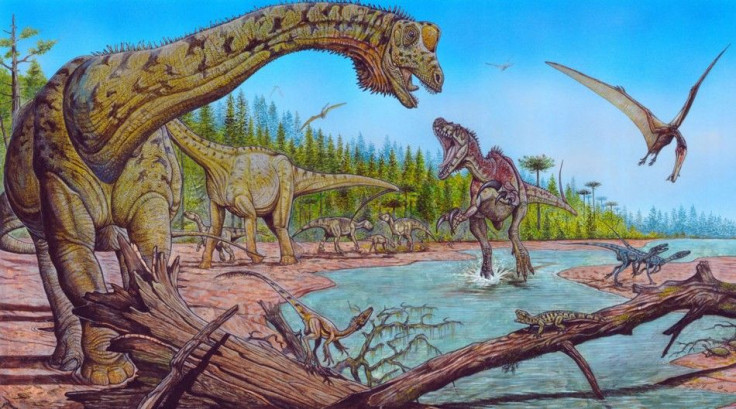Laying Eggs May Have Contributed To Dinosaur Extinction

Egg laying contributed to the extinction of dinosaurs 65 million years ago, according to research released Wednesday.
Researchers argued that egg laying put dinosaurs at a distinct disadvantage compared to mammals that give birth to live offspring. Further, researchers found that eggs physically limit a newborn's size, leading to smaller, disadvantaged dinosaur offspring.
The shell itself is limited in thickness, Daryl Codron, study author and post-doctoral researcher at the University of Zurich, told MSNBC. It cannot become so thick that gas can no longer diffuse through it, which would deprive the embryo of oxygen. For a very small egg-laying animal this is no problem, but it does mean that very large animals have to produce relatively small eggs.
The 8,000 pound (3,600 kilogram) Titanosaur hatched babies that were approximately 3 pounds (1.5 kg), 2,500 times smaller than adults, according to the study. Asian elephants, which typically weigh about 6,000 pounds (2,700 kilograms), give birth to offspring that are about 25 times smaller than the mother.
As dinosaurs grew, they had to try and wedge their way into several different niches filled by similar-sized mammals. Over time, this led to dinosaurs growing larger and larger to gain a competitive edge or staying very small, which is why there were few dinosaurs that weighed between 2 and 2,000 pounds (1 and 1,000 kilograms), researchers said.
When a meteorite hit and caused a mass extinction of large animals, there were few, if any, dinosaurs left to repopulate, which allowed mammals to spread out and diversify, according to the study. Any dinosaurs that still existed had to find a new niche to fill, which may have led them to develop into birds, researchers said.
Our results might actually provide an explanation for the evolution of flight,Codron told Discovery News. These small dinosaurs simply had to find a new niche away from mammals because they suffered competition from both each other and from mammals.
Paleontologists found mammalian fossils with dinosaurs in their stomachs, indicating that mammals did, in fact, outcompete with dinosaurs in some cases, Christine Janis, a professor of biology at Brown University, who was not involved in the study, told Discovery News.
Nobody thinks about the fact that all dinosaurs went through small, fairly independent stages where competition with mammals could be an issue, and that this could affect repopulation outcomes following a mass extinction, she said.
Although interesting, the findings will be hotly contested over their accuracy, John Hutchinson, an evolutionary biologist at the Royal Veterinary College, told Nature.
I love the idea that egg-laying led dinosaurs to engage in such different niche occupation from mammals and that this played a part in their eventual extinction, but we are going to see a lot of debate over how accurate these models really are.
The journal Biology Letters published the study on Wednesday.
© Copyright IBTimes 2025. All rights reserved.





















